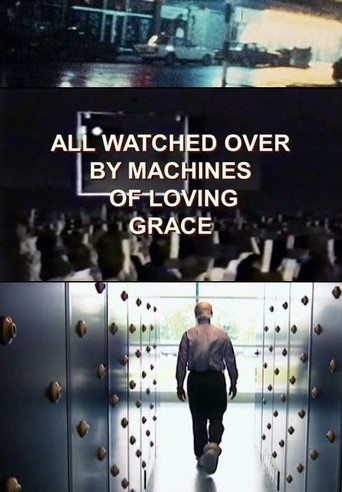All Watched Over by Machines of Loving Grace (2011)
A series of films about how humans have been colonized by the machines we have built. Although we don't realize it, the way we see everything in the world today is through the eyes of the computers.
Watch Trailer
Cast


Reviews
Sadly Over-hyped
Excellent but underrated film
As Good As It Gets
The story, direction, characters, and writing/dialogue is akin to taking a tranquilizer shot to the neck, but everything else was so well done.
I agree with a lot of what has been written about this documentary, but I think some people miss the point. The documentary starts out being almost a Terminator inspired sub-title "The rise of the machines" and describes all the evil machines, but at the end the conclusion is *we* are the machines, the our DNA is the program. Viewed in that light, computers are mere extensions of ourselves and in a way are an attempt to make the computational abilities of the brain more perfect. There are still many, many things the organic brain can do better than a computer, subtle things like social intelligence, body language, emotional intelligence. These are more difficult to encode in a computer because they don't follow the same rules as simply adding 1+1. It is clear evidence that we don't exactly understand the process ourselves, which is why we can't program it into a computer.As I watched this documentary, I was floored by the similarities to a audibook I was listening to by the Dalai Lahma which talked about altruism and how it fits into the selfish gene model. Obviously Dalai Lahma takes a very different view on altruism, believing that it represents a higher function of human existence that cannot be explained by Darwinian view of the selfish gene. This documentary takes the counter view that altruism is just another way of preserving the gene, but it stumbles a little bit by only giving altruistic examples where the individual sacrifices itself for the continuation of it's relatives or the destruction of non-relatives. What about altruistic acts which are for the benefit of non-relatives? There is no adequate scientific explanation for this, yet it happens continuously throughout history. Then again, perhaps it is just another form of insanity.In any case, this documentary is not about computers taking over the world, it is about the belief of HUMANS AS MACHINES and this BELIEF taking over the world. Curtis does not go back farther than Ayn Rand and the 1930s, but surely this idea started with Nietszche and Darwin. In fact then Rand said that Aristotle was the only philosopher that influenced her, I found that hard to believe, because her ideas sound very similar to Nietszche's. This struggle is often interpreted politically as right vs left, materialism vs idealism, capitalism vs socialism.When Curtis ventures into the realm of the online world, here too he stumbles, he attempts to show that "cyberspace" was developed to try and imitate the stable natural ecosystem, but in reality was extremely chaotic. Yes, the online world of blogs, email, texts and tweets can be a mess, but if you look at the growth of illegal downloading, this is surprisingly stable, coherent and efficient. This system of peer-to-peer downloading arose completely spontaneously, and has developed into an extremely reliable way of downloading content, which has built in self regulating processes. This is surprisingly similar to the way a natural ecosystem might develop, including the existence of viruses and anti-viruses.Even with all it's flaws, I can't help but be awe-struck by the Herculean and virtuosic editing techniques used by Curtis, and the unique and incredibly moving use of music to juxtapose against various images. It can be cliché to superimpose happy music over tragic images, but Curtis does it such a way that it just seems brilliant. It's like Tarantino meets David Attenborough meets Radiohead. I would be very surprised if Curtis chooses the music himself, it's hard to imagine someone with such a stuffy English accent could be so hip, but appearances can be deceiving.I highly encourage anyone seeing this to watch his other documentaries, they are all done in his trademark style, which is unique and, at least artistically, unmatched in the documentary world.
Adam Curtis' recent documentary series disappointed some. Compared to his work on The Century Of The Self and The Power Of Nightmares, it seemed hodge podge, lacking a central framework idea and bouncing all over the place.After twenty minutes of the first episode, I may have been inclined to agree – the documentary seemed to lack focus and carried over the experimental mix of music and image that had been used so successfully for the interactive theatre piece "It Felt Like A Kiss".However, having seen the full piece, I now beg to differ. If anything, the series is a broader and more satisfying development of areas touched on in his previous pieces, particularly Century Of The Self.As with Curtis' other work, it explores the far reaching and (for the most part) unintended consequences of big ideas. In this case, the idea that nature can be explained and entertainingly presents a series of case studies to explore whether this idea is flawed or not. Unlike his previous pieces, the period under discussion is very recent and the ideas explored so varied that each episode does not really follow a linear timeline and the debates bounce from the 1950s to the 1990s to the 1960s to the present day.This is a powerful and thought provoking piece, Curtis never comes across to me as polemical and seems happier drawing your attention that things may not be quite as they seem rather than hitting you over the head as he proves everything you know is wrong.Everything you know isn't necessarily wrong but it may be that you aren't fully informed of all the facts. The opening sequence may be the the weakest of the series, linking Ayn Rand's ideas of Objectivism to the development of moden computing. However, clever dick that Curtis is, it only becomes apparent with the patience to sit through this that the central character isn't Rand at all but a member of her social circle, Alan Greenspan – who, as chairman of the US Federal Reserve became, through a series of unforeseen events, the most powerful man in the world for a brief period.The subsequent rattle through the economic crises in the Far East in the 90's and the knock on effect to the current economic crisis in the West (and China's part in it) is eye opening to say the least. And it goes on, finding short degrees of separation from a multitude of players on the world stage, linked by the rise and consequences of ideas relating to systems. The second episode then explores the theory of self organising networks through cybernetics, eco politics, the geodesic dome, the 60s counterculture, maximum population growth to the Facebook/Twitter revolutions of the 2000s.I was especially impressed with the final episode exploring the theory of the selfish gene, moving from the initial theory through Anglo- American intervention in the Congo, myths on the origins of the AIDS virus, the Belgians role in the genocide of Rwanda through Richard Dawkins and Dian Fossey.Fascinating stuff and well worth three hours of anyone's time.
ALL WATCHED OVER MY MACHINES OF LOVING GRACE is a documentary purporting to explain the negative impact of computers and computer thinking on our society. But as this is Adam Curtis making it the result is a documentary that ranges from gorillas in the Congo to Ayn Rand rather than taking a straight A-Z. Unfortunately, in common with much of his other work, despite the sheer breadth of material covered and Curtis's undoubted skills in melding image and music, the actual argument is extremely dubious, poorly argued, lacking in evidence and frequently incoherent.Instead the documentary relies on Curtis's soothing tones (he does the v/o) and constant changes in ideas, music and images, in order to bamboozle the audience. This method of constant change prevents you thinking clearly as your attention is always being called to something else. Once the programme stops and you begin to think about it without the benefit of music, image and voice, you realise just how dodgy the whole argument is.My other usual problem is that, whenever Mr Curtis touches on a subject with which I am familiar, I usually discover he is wrong or at least generalising to a dangerous degree. Thus the entire section on the decolonisation of the Congo basically blames the Belgians and more generally the West for the near immediate collapse of that unhappy country. There is no hint that the inhabitants of the Congo could even think or act for themselves. Curtis paints a picture of local tribes living in perfect pre-European harmony (conveniently forgetting the original inhabitants of the Congo - the pygmies) that is at odds with reality. There are a large number of similar errors. My worry is that, if Curtis is so often wrong when he talks about things that I know well, then is he also wrong about the things I don't know well?The sad thing is that every poor Adam Curtis documentary is an opportunity lost. The BBC has frankly given up on even trying to make documentaries on such complex subjects (even BBC4 is more arts than intellect). And nobody else has access to such a great amount of archive or the funds to really sift through it (hence why you always see the same archive on documentaries).
An excellent series with important messages (including: an imagined potential for systems to liberate us, ended up controlling us). It's Wikipedia page is informative.Curtis brilliantly and laudably identifies grave problems. But humanity was so foolish to end up with those problems, the series left me wanting. Nothing I'll say impacts his sound theses, but it's Curtis' only series that moves me to other than praise.A primary theme of Curtis' filmography is the tragicomic consequences of ideologies imposed by elites; I love his films so I expect and embrace foolish targets. And identifying problems brings no responsibility to also solve them, particularly when identification is such an impressive contribution. But the fools gallery Curtis necessarily targets while developing the series' theses are so transparent and sterile that I believe more view through them, to depth and substance beyond, was called for. I'm so astonished that their beliefs attracted attention let alone gained currency, and the richly deserving targets are so much more delusional pushovers than in Curtis' other films, that I wanted more. (And I'm more mystified than before by how information processing enchants the analytically-challenged.) Curtis shows both the Internet and systems models fail to deliver things--that it was foolish for anyone to ever imagine they could.(Because I'm not as engaged by this series' topic as I am by Curtis' other best work, on first viewing I made large errors because it's complexity exceeded the attention I paid.) In episode one (e1) I thought Curtis drew a parallel between Ayn Rand and the Internet. On second viewing I found I was wrong. Rand and the Internet share the story in e1. And Curtis draws attention to that, such as when phrasing the belief some held that "computers would liberate us from all the old forms of political control, and we would become Randian heroes in control of our own destiny" (e1@58:17).Curtis shows the Internet couldn't do all the things some people believed it would. And he mentioned that the Internet can do some of those things, but he didn't note that those things it can do were the ones antithetical to Rand, which I think he should've given the attention he draws to Rand and the Internet in his story together, both failing fools.Curtis notes "the Internet had played a key role brought millions of people together" (e2@52:05) for revolutions in former Soviet states last decade. As we again saw during 2011's Arab Spring, in contrast to Rand's non-embrace of community, online social media's ability to manifest a collective consciousness can play an encouraging role in enabling a revolutionary wave.So while Curtis is correct that machines have not liberated us from traditional political structures, they can galvanize the action necessary to start. Thereafter OF COURSE it's up to us to organize the realization of our vision (since, as Curtis points out, "the machines offer no ideas about what comes next" {e2@58:09}). (Incidentally, Curtis' "The Century of the Self" explained that politicians today cede power to the unconscious desires of swing voters, which also deliver no organized or coherent vision forward.) Curtis notes hippie "communes {failed because they} deliberately had no hierarchy of control or authority" (e2@20:33). I lived in a 250-person alternative community of "hippies", and it ran beautifully because like most hippies and non-hippies then and always, we weren't foolish enough to think organization wasn't necessary.(OTOH, while hierarchy is often necessary, marriages can work without one spouse having authority over the other. Had communes remained small enough, and bonding been very strong, people's hearts could've done at least some of what was lacked by, and thus doomed, communes. That might suggest a way forward globally; particularly if Carpenter's 1991 "Pong" experiment {e1@9:21} demonstrated collective connection. Changing people could change politics; the Dalai Lama received an uncommon {anti-Randian} education, and he turned out pretty well; humanity should commit to universally high psychological health/development.) Foolish targets abound. E1's computer visionaries were naïve fools, and Ayn Rand's philosophy is the product of a nearly peerless psychological/emotional infant.E2 brings more idiotic beliefs, such as that inherently lossy models can faithfully reflect reality, and that disturbed ecosystems "would always try to return to an original balanced state" via a purely imaginary "underlying mechanism" (e2@5:03). It's pathetic that Forrester's systems model for the planet's ecosystem "could not imagine a future where human beings, unlike machines, would behave in ways that they hadn't before" (e2@35:35).Regarding the ecosystem model, while Curtis correctly points out it's not true, neither does it have no truth at all. There are interactions between different things in the natural world; they influence each other positively and negatively. The existence of interactions can foster a degree of stability (relative to hypotheticals with minimal interactions), albeit to an essentially dynamic reality (at all scales). The reality of interaction--for example that human actions can cause great harm--makes that part of the ecosystem model of use in understanding, and of motivational use (towards achieving optimally vital results). I think Curtis should've acknowledged these values of the ecosystem model, since they were all anyone who wasn't foolish ever thought it was really right for.{Perhaps asserting that interactions can foster some stability needs no justification. But just in case, a simple hypothetical: a habitat containing grazing animals. Too many of which might cause dramatic population decline, for example from increased risk of epidemic or from stripping the habitat; later (after the epidemic ends or the habitat recovers) the grazers' population might soar. But add to this hypothetical a different animal that preys successfully enough upon the grazing animals to lower such risks, and both the habitat and grazing animal population could gain relative stability.} The series is so densely packed that little could've been added without requiring another part, but with another part I think it could've been substantially stronger. I can't fault Curtis, but I also can't say that all that it did prevented me from feeling more was called for.







